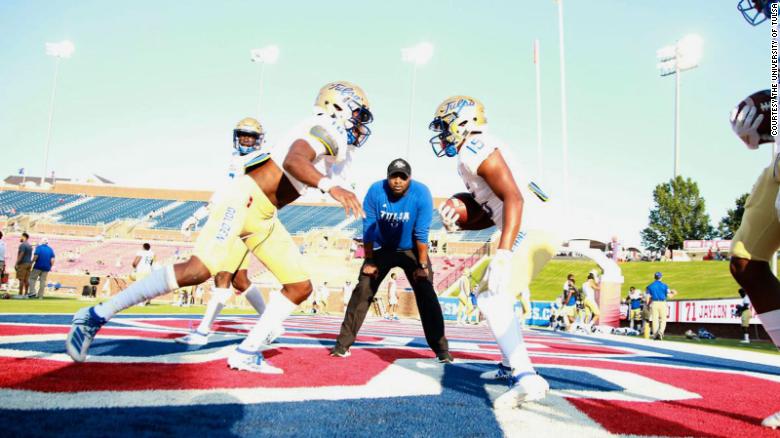Oklahoma college football coach Aaron Fletcher and his team will pay their respects to one of the darkest moments in their state’s and America’s racial memory.
The assistant coach of the University of Tulsa Golden Hurricane has organized the “Legacy of Black Wall Street” game-day program on Friday to remember the Tulsa Race Massacre of 1921.
The inaugural game will feature video tributes and interviews with descendants and survivors of the attack that leveled the historic Freedmen’s town of Greenwood, Oklahoma. The game will be an annual tradition on the second home football game for the university.
“I thought it was crazy that I never knew about it, that I was never taught about it,” Fletcher tells CNN. “That was shocking, to say the least. And when I learned about it — when I first got here. It changed my life.”
The Texas native, who was raised in Austin, and began coaching at TU five years ago hopes that Friday’s game will break the cycle of excluding the legacy of Black Wall Street from history.
Like many generations of American students, he says he wasn’t taught about the Tulsa Massacre in school. Many records were destroyed, suppressed and deliberately excluded from the curriculum.
“I came up during the time that was right off the heels of segregation,” Fletcher, 43, reflects.
And while he says he knew a lot about history, he didn’t know much about the history in the neighboring state of Oklahoma.
Fletcher received an informal education on the massacre from fellow Black Tulsa residents and it even came up during conversations at a local barbershop.
“It blew my mind because I didn’t know bombs were dropped. I’ve known and read in different parts of history where people were hung or burned and stuff like that. But it never occurred to me that anything was bombed by plane,” he says. “And that’s when I knew this was totally different than any other situation and for people to not have talked about it was alarming to me. And it was just saddening.”
What happened in Tulsa in 1921
Tulsa was once home to one of the most prosperous African American communities in the country. Dubbed Black Wall Street, Greenwood was originally founded as a Freedmen’s colony of emancipated slaves and became a home to thriving schools and businesses. Native Americans and Black residents became wealthy after the discovery of oil in the early 1900s on what had previously been seen as worthless land.
Neighboring White Tulsans had longstanding issues with the self-sufficient Black town, and violence sparked after allegations that a Black man had assaulted a White elevator operator. While Black residents rushed to the Tulsa County Courthouse to prevent a lynching, White residents were deputized and handed weapons.
Over the next 12 hours, the city of Greenwood experienced an all out assault fraught with arson, shootings, and aerial bombings from private planes. By the morning of June 1, 1921, Greenwood had been burned to the ground.
Death toll estimates have fluctuated over the years, but as many as 300 people were killed, and nearly 6,000 Black residents were interned in nearby facilities until it was safe to pick up the remains of their previous lives and start over.
Today, eyewitness accounts of the racial massacre are housed among the collections of the Smithsonian’s National Museum of African American History and Culture.
Coffins found in mass graves have been excavated as part of the modern-day study on the American massacre.
Two TU Graduate students even started the #TulsaSyllabus project to serve as a resource for researchers, activists, educators, the press, and general public to gain a better understanding of how race and racism manifest in Tulsa, Oklahoma.
What activism looks like
The strides being made today may not erase the damage done to Greenwood or the collective traumas of Black Americans, but Fletcher and others like him hope these efforts help atone for a tragic history.
By establishing the annual ‘Legacy of Black Wall Street’ game, Fletcher wants to demonstrate to his players how to build social action using the resources available to them.
His activism shows his players as well as his own children that coaching does not strictly limit his influence to the 100 yard field. It is also about influencing others to be conscious, contributing members of their community.
“Under that hat of coach there is counselor, there’s brother, there’s father, there’s mentor, there’s advocate, there’s facilitator. If you want our young people, men and women alike, to be successful you have to start communication.”
>>>>

